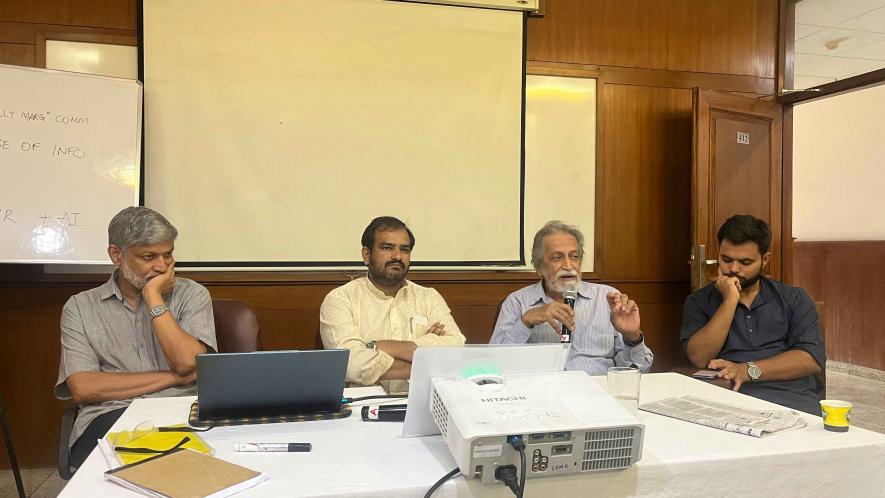Modi Govt Doles Freebies to Capitalists, but Smears States for Giving Rights, Say Activists

Image courtesy: Ravi Kaushal
New Delhi: Activists and economists gathered at Indian Social Institute in the national capital on Wednesday to denounce the “smear campaign” by the Bharatiya Janata Party (BJP) and its affiliates against rights-based laws passed in Rajasthan this week.
Addressing a press conference, the activists alleged that the BJP-led Union government was “giving freebies to the super-rich but smearing state governments for introducing affirmative laws.”
The Congress-led Rajasthan Assembly recently passed the Rajasthan Minimum Income Guarantee Bill and Rajasthan Gig Workers Social Security Act. The minimum income guarantee Bill proposes to ensure 25 days of additional work in the Centre-run Mahatma Gandhi National Rural Employment Guarantee Act (MGNREGA) which promises 100 days of work in rural areas. It has also ensured 125 days of work in urban areas through the Indira Gandhi Urban Employment Guarantee Scheme and a pension of Rs 1,000 to elderly, widowed and disabled persons with a 15 % increment per year.
The Rajasthan Gig Workers Social Security Act provides for a cess to be collected from each transaction on the platform for the welfare of the workers and the formation of a tripartite board with an initial fund of Rs 200 crore and representation of workers' unions, platforms and government.
Speaking at the press conference noted economist Prabhat Patnaik said introducing minimum income guarantee as a Bill was “reassuring.” However, its implementation needs to be seen if the government’s action follows the spirit of the Act, he added.
“Many states introduced the provision of minimum income guarantee as a scheme but not as law. I worked with the Kerala Planning Commission, and we introduced it as the annual plan of a certain amount to be spent on minimum income guarantee because the law could not be passed in the Legislative Assembly. Passing it as a law makes it a statutory force and a right. Fundamentally, I like that this spate of measures leads to a rights-based approach to the welfare state,” he added.
Patnaik said opposition to these measures was widely known. Prime Minister Narendra Modi himself has called these measures “freebies”.
“Calling these measures freebies is not only anti-poor but anti-democratic too. Democracy is not periodic elections but people’s freedom to air their opinions about contemporary issues. Nobel Laureate Amartya Sen calls democracy a government by discussion. If it’s a government by discussion and people need to participate in this discussion, there have to be rights to food, income and housing. For a long time in academia, there has been discussion to opt for a rights-based approach on the basis of constitutionally guaranteed political rights to enable people as participatory citizens,” he added.
The economist said questions were often raised about where the resources would come from. “I do not know the financial status of Rajasthan. Still, we did calculate the costs at the national level if we were to give five fundamental economic rights, including food, free education up to the secondary level, quality health, employment and living old age pension. We found that government will have to spend about 10% of the Gross Domestic Product (GDP), but if we adjust the costs because some spending will come back to it as taxes, it will have to spend 7% of GDP,” he said.
The senior economist also suggested that a wealth tax of 2% on the top 1% of the population and a one-third inheritance tax needed to be imposed to raise resources.
“Through these taxes, you can properly finance the welfare state in India. So, the argument for the unavailability of resources is flawed. The banks have written off Rs 10.5 lakh crore of bad loans in the past five years, which comes to Rs 2 lakh crore per year. So, the freebies to capitalists and monopolies are the real philosophy of this government. The Rajasthan government’s measures are a matter of great satisfaction,” he said.
Speaking about the struggle of gig workers and the new law, Shaikh Salahuddin, president of the Indian Federation of App-Based Transport Workers, said Rajasthan, the law has kept Rs 200 crore aside to form a tripartite board where the representatives of platforms, workers, and government will sit to discuss the schemes to be brought out for the welfare of the workers.
“Accidents and casualties are the first things that come to mind because gig workers are always on the run. Insurance schemes for such workers need to be worked upon. However, we are happy that the Rajasthan government recognised our struggles. Along similar lines, Karnataka has reserved Rs 3,000 crore for benefits of gig workers, including insurance, wage and working hours, after we built pressure to include our demands into the Congress manifesto before elections and still demanding a law to have a guarantee over benefits. We are seeing a new attack through platforms where IDs are blocked, be it Blinkit, Uber, Swiggy or Zomato, and governments are turning mute spectators to it,” Salahuddin added.
On the introduction of the Scheduled Castes (SC) Plan and Scheduled Tribes (ST) Sub Plan in the state, Neeraj Gautam from National Association for Dalit Human Rights said groups from marginalised SCs and STs have been waging a struggle to get funds from budget allocation as per the SC Plan and ST Sub-plan.
“Much has been written on paper. But our experience suggests that a huge chunk of money meant for the welfare of SC communities has been diverted toward the construction of stadiums during the Commonwealth Games and the construction of roads. However, the new thing about this new law is its transparency and accountability clause. I hope much of the law is implemented,” Gautam said.
Get the latest reports & analysis with people's perspective on Protests, movements & deep analytical videos, discussions of the current affairs in your Telegram app. Subscribe to NewsClick's Telegram channel & get Real-Time updates on stories, as they get published on our website.
























